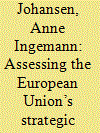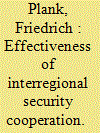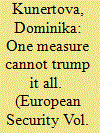|
|
|
Sort Order |
|
|
|
Items / Page
|
|
|
|
|
|
|
| Srl | Item |
| 1 |
ID:
155693


|
|
|
|
|
| Summary/Abstract |
This article argues that the European Union’s capacity to use an operational instrument for the purpose of an articulated objective constitutes an important, but conceptually neglected and empirically underexplored, element of its actorness. In order to fill this gap, the article introduces the concept of strategic capacity and develops an analytical framework for systematic empirical assessments thereof. Drawing on 22 qualitative expert interviews, the framework is applied to the EU’s maritime operation against human smugglers in the Central Mediterranean (EUNAVFOR MED Operation Sophia). The article finds that the EU so far has displayed a fairly low degree of strategic capacity in its fight against human smugglers. The article argues that this fairly low degree of strategic capacity is not to be ascribed to an institutional apparatus that is unfit for strategic action, but a decision on the part of political decision-makers to give weight to symbolic, as opposed to strategic, action. As a result, the operation has contributed little to the formal objective of disrupting and dismantling human smuggling networks in the Central Mediterranean. In some areas, it has even had an adverse effect on this objective.
|
|
|
|
|
|
|
|
|
|
|
|
|
|
|
|
| 2 |
ID:
155692


|
|
|
|
|
| Summary/Abstract |
African Union (AU)–European Union (EU) interregional security cooperation has not so far been analysed systematically with regard to its effectiveness despite the substantial support of African capacity building by the EU and joint peacekeeping of the partners. Assessing AU–EU cooperation in the Central African Republic (CAR), this paper examines to what extent and under which conditions EU–AU efforts are effective. Concerning the dependent variable, the presented conceptualisation of effectiveness includes both internal (goal attainment) and external (problem-solving) perspectives. The independent variable draws on two strands of literature that barely speak to each other: interregionalism and inter-organisationalism. It focuses on the conditions of effectiveness which include both internal (RO-specific) and interregional factors. The findings suggest that AU–EU engagement in the CAR was effective in the medium term. Strong incentives of the partners, the French leading role and the convergence of the partners are identified as factors conducive to a medium to high effectiveness of the engagement.
|
|
|
|
|
|
|
|
|
|
|
|
|
|
|
|
| 3 |
ID:
155691


|
|
|
|
|
| Summary/Abstract |
One of the core principles of EU interventions under the Common Security and Defence Policy (CSDP) has been local ownership. While the EU takes pride in fully respecting this principle, the existing research suggests that the implementation has been far from smooth. However, we still know very little how this principle is conceptualised and operationalised, let alone why its implementation has been so difficult. Drawing on document analysis and 27 in-depth interviews, the article makes 3 arguments. First, ownership is increasingly construed in the EU policy rhetoric as a middle ground between imposition and restraint. Second, in practice, ownership is operationalised as an externally driven, top-down endeavour, resulting in the low degree of local participation. Third, in addition to the obstacles normally faced by other peace-builders, the EU’s efforts to implement ownership are constrained by the politics and policy-making of CSDP. The arguments are illustrated in a case study of the European Union Mission on Regional Maritime Capacity Building in the Horn of Africa (EUCAP Nestor).
|
|
|
|
|
|
|
|
|
|
|
|
|
|
|
|
| 4 |
ID:
155695


|
|
|
|
|
| Summary/Abstract |
This paper calls for a qualitative turn in discussing NATO burden-sharing. The paper takes issue with the numerical burden-sharing narrative in NATO and identifies its two main problems. Despite being simple, the 2% defence spending pledge lacks other basic attributes of any contributory system: fairness and effectiveness. Drawing from concepts of distributive justice, the paper analyses NATO’s first burden-sharing debates and demonstrates that due to their qualitatively different capabilities, the allies agreed on an egalitarian ability-to-pay distributive justice. Furthermore, it shows that the allies refrained from implementing fairness in terms of a one-size-fits-all formula, since this simple numerical approach could not produce fair and effective burden-sharing at the same time. Rather, they developed a dynamic framework for optimal sharing. These formative burden-sharing debates provide valuable lessons learned for the current build-up of NATO’s posture: less focused on formal sharing, more concerned with strategic outputs.
|
|
|
|
|
|
|
|
|
|
|
|
|
|
|
|
| 5 |
ID:
155694


|
|
|
|
|
| Summary/Abstract |
While many have noted that EU member states have different preferences over the prospect of an integrated EU defence, analyses that specifically explore state–industry relations in the definition of EU defence-industrial issues, and in the evolution of the Common Security and Defence Policy in general, are lacking. This is surprising, given that different configurations of government–industry relations have represented a persistent impediment to European defence-industrial cross-border collaboration. This article investigates how state–defence industry relations impact on member states’ preferences towards the EU defence-industrial framework. Based on the case studies of the interaction of France and the UK with the European Defence Agency, this analysis focuses on the difference between public and private defence firms’ governance settings as the crucial explanatory variable accounting for diverging member states’ preferences in this domain.
|
|
|
|
|
|
|
|
|
|
|
|
|
|
|
|
|
|
|
|
|